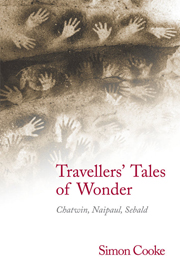Book contents
- Frontmatter
- Contents
- List of Illustrations
- Acknowledgements
- Introduction: The Wonder that Came Later
- I ‘Horizon of expectations’: Travels in Literary History
- 1 A Question of Form: Genre and the Journey
- 2 ‘An End to Journeying’: Travel and its Discontents in Late Modernity
- 3 Forms of Recovery and Renewal: Travels in Contemporary Literature
- II Readings in Contemporary Travellers' Tales of Wonder
- Afterword: The ‘unlimited vicissitudes of travelling’
- Bibliography
- Index
1 - A Question of Form: Genre and the Journey
from I - ‘Horizon of expectations’: Travels in Literary History
Published online by Cambridge University Press: 05 October 2013
- Frontmatter
- Contents
- List of Illustrations
- Acknowledgements
- Introduction: The Wonder that Came Later
- I ‘Horizon of expectations’: Travels in Literary History
- 1 A Question of Form: Genre and the Journey
- 2 ‘An End to Journeying’: Travel and its Discontents in Late Modernity
- 3 Forms of Recovery and Renewal: Travels in Contemporary Literature
- II Readings in Contemporary Travellers' Tales of Wonder
- Afterword: The ‘unlimited vicissitudes of travelling’
- Bibliography
- Index
Summary
Voyages and travels are among the oldest and most culturally widespread forms in literary history. Among the earliest extant texts is a traveller's tale of an island of marvels, ‘The Shipwrecked Sailor’ (Tappan 1914: 41–6), written in Egypt's Twelfth Dynasty (that is, around 2200 bce). The journey is the common denominator for accounts as varied as The Histories of the ancient Greek Herodotus, Egeria's pilgrimage to the Holy Land in the fourth century ce, the writings of household-name scientists such as Charles Darwin with Voyage of the Beagle and works by canonical literary authors such as Henry James, with Italian Hours. And from The Epic of Gilgamesh, the Sumerian quest narrative dated at around 2000 bce, to the ancient epics, to the world's religious texts, to the emergence of the Western novel, the journey is a perennial motif. Homer's Odyssey, Exile and Exodus, the Norse sagas, the early Germanic Widsith, the Anglo-Saxon poem Beowulf, Thomas More's Utopia, Cervantes' Don Quixote, Defoe's Robinson Crusoe – all are cases in point. Travel, real or imagined, prompts tales, oral or written. In ‘Der Erzähler’ (‘The Storyteller’), Walter Benjamin cites a German proverb: ‘“If one goes on a journey, one has something to tell”’ (Benjamin 1977: 386; my translation). And conversely, tales, oral or written, imply a journey, literal or figurative. That German saying could well be supplemented: ‘If one has something to tell, one has travelled.’ Readers, too, may be ‘transported’.
- Type
- Chapter
- Information
- Travellers' Tales of WonderChatwin, Naipaul, Sebald, pp. 15 - 22Publisher: Edinburgh University PressPrint publication year: 2013

